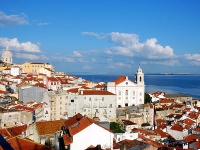Airport
Lisbon Portela Airport
IATA Code: LISLocation: The airport is five miles (7km) north of Lisbon.
Time: GMT (GMT +1 between the last Sunday in March and the Saturday before the last Sunday in October).
Contacts: Tel: +351 (0)21 841 3500
Transfer to the city: The Carris Aerobus no 91 runs every day between 7.45am and 8.45pm, connecting Lisbon Airport to the city centre. Tickets cost EUR1.35, purchased on the bus; you can also purchase an all-day bus and tram network pass for EUR3.35. A shuttle bus service also operates between the airport and the resorts of Estoril and Cascais. Taxi stands are situated outside departures and arrivals. The meter should read EUR2.35 (daytime pick-up) or EUR2.50 (at night) at the start of the ride. Fares are 20 percent higher on weekends, holidays and at night.
Taxis: Taxis can be found outside of the arrival and departure area. Some taxis will charge extra for luggage but fares should be kept to a maximum of US$15 and a bit more at night. Some metered taxis will try to take a longer route to the city centre but rides should take less than 15 minutes for a five mile (7km) ride.
Car rental: Car rental companies represented at the airport include Avis, Budget, Europcar, Hertz, National and Sixt.
Facilities: There are a range of passenger services at Lisbon Airport including ATMs, bureaux de change, showers, a post office, left luggage, baby care facilities, meeting rooms and a help desk in both Arrivals and Departures. There are a wide variety of restaurants and shops, including a duty-free. Disabled facilities are good; passengers requiring wheelchairs should contact their airline.
Parking: Parking is available and can be reserved in advance via the airport website.
Departure tax: None.
Website: www.ana-aeroportos.pt
Visit worldtravels.com for the full guide to Lisbon. Build a complete Lisbon travel guide and email to your clients - sign up for a trial subscription of World Travels Pro.
Lisbon

The capital of Portugal has experienced a renaissance in recent years and has reclaimed its rightful place as the 'golden city' of southern Europe. After slumbering for decades, the city's modern, vibrant and cosmopolitan identity is today much similar to that which it enjoyed in the 15th and 16th centuries during the age of the great discoverers, when Lisbon was the centre of trade with the East and the starting point for maritime exploration of the globe.
The city fathers of Lisbon elected to invest in some rejuvenation in the 1990s, and this ongoing focus on the future has made the most of the city's attributes and attractions, both old and new. Infrastructure has also been improved, with additions like the impressive Vasco da Gama Bridge across the River Tagus, which links the city's airport to a network of national motorways and has facilitated access to other parts of Portugal. There is also a new showcase railway hub, the Gare de Oriente, which is the pride of a new modern suburb on the east bank of the Tagus, creating an even better link between Lisbon and the rest of Europe.
While much is new, there is plenty of the old left to charm visitors, giving the metropolis a slightly provincial air. The delightful, picturesque medieval section of Alfama skirts the city's Sao Jorge castle, and historic wooden trams ply noisily up and down steep hills past art deco cafes and mosaic-decorated pavements. Many of the relics of the city's golden age were destroyed in an earthquake in 1755, but some survived and are popular tourist attractions, complemented now by modern sights, like the futuristic Oceanarium.
Within easy reach of the city are the sandy beaches of several coastal resorts, such as Costa da Caparica, Estoril and Cascais, as well as the forested areas of Sintra and attractions like the extraordinary Mafra monastery. The mood of Lisbon is light and bright, confident, fresh and avante garde, ready to welcome the world to the doorstep as one of the great capitals of Europe.







